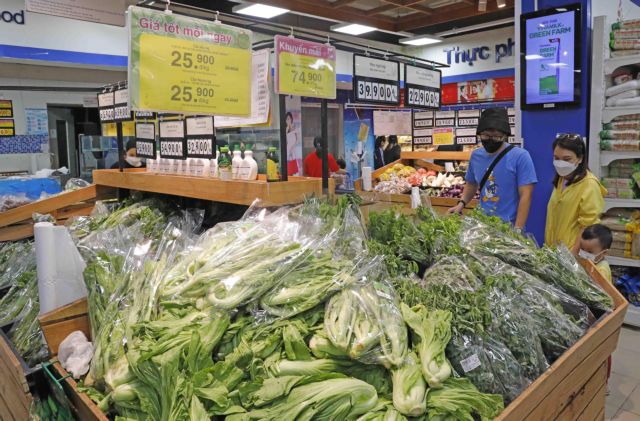 Economy
Economy


|
| Vegatables in a Co.op Mart Hà Đông, Hà Nội. It’s time for the agriculture sector to apply VietGap as a compulsory standard. — VNA/VNS Photo Trần Việt |
HÀ NỘI — More attention must be paid to ensuring agricultural products in the domestic market meet good agricultural practice standards, experts have said.
While Vietnamese agricultural products continuously conquered several demanding markets with the most stringent standards in recent years, including the US, EU and Japan, especially in food hygiene and safety and origin, meeting standards for the domestic market with around 100 million people was neglected.
The two most popular standards in Việt Nam were the Vietnamese Good Agricultural Practice (VietGAP) and Vietnam Good Animal Husbandry Practice (VietGAHP).
According to the National Agro-Forestry-Fisheries Quality Assurance Department, as of the end of 2022, around 480,000 ha of plantation areas were certified VietGap or equivalent. More than 900 farms and 2,540 husbandry households were certified VietGAHP.
The area of farming, aquaculture and livestock production, which met VietGap standards, was still modest compared to the cultivation and scale of Việt Nam. In addition, Việt Nam has not had any regulations requiring supermarkets, shopping centres and wholesale markets to sell VietGAp products. Thus, it was difficult for consumers to know the quality of products on shelves,
Nguyễn Đình, general director of Vina T&T Import and Export Trading Service Company, which specialises in exporting Vietnamese fruits to dozens of countries, said that many agricultural products were present in countries around the world. However, in Việt Nam it seemed that there were not many places for consumers to buy agricultural products that met rigorous standards.
Tùng said that Việt Nam with its 100 million population, was a potential market to promote consumption, but many enterprises did not pay attention to the domestic market.
According to the Việt Nam Association of Seafood Exporters and Processors, around 280 member companies of the association accounted for 80-83 per cent of Việt Nam’s total fishery export, but only 26 of them supplied the domestic market through the supermarkets and distribution system.
Meanwhile, the consumption of seafood by Vietnamese people was increasing sharply in recent years, averaging around 27 kilograms of fishery products per person per year, not much lower than in big markets.
Nguyễn Thị Hồng Minh, President of Association of Food Transparency, said that globally, besides stringent general regulations, each supermarket had its own set of criteria for each group of products.
For example, for vegetable products, the supermarket would sign directly with farmers and have a supervisory team to control the quality.
In Việt Nam, not many supermarkets did this due to resource limitations. So, they often had to go through an intermediary, making it more difficult to control quality.
To help consumers avoid confusion about product quality in the domestic market, Minh said that the agriculture and rural development ministry needed to review and strictly control the issuance of certificates of growing areas and food safety for agricultural products.
The list of VietGap-certified establishments must be made public with information about the cultivation record and transactions.
She added that ministries should raise regulations requiring supermarkets, shopping centres and wholesale markets to sell agricultural products which meet required standards.
“Currently, the living standards of Vietnamese have been much improved, and the middle class is growing rapidly, pushing up demand for quality and safe products. Only when we do it methodically and successfully with the domestic market will the world believe that Việt Nam is serious about meeting quality standards and attaching importance to food safety when exporting,” Minh said.
In 2022, more than 27,599 agricultural establishments were inspected, of which more than 2,240 were found to violate food hygiene and safety regulations.
It’s time for the agriculture sector to apply VietGap as a compulsory standard, Nguyễn Thị Lan Hương, chairwoman of Việt Phúc Production and Import – Export Joint Stock Company said, adding that Việt Nam had gone through the stage of agricultural development in term of output and now was the time for farmers to produce to create quality products and ensure food hygiene and safety.
“If VietGAP is compulsory, agricultural products of Việt Nam are almost capable of being sold worldwide. We only need to learn about the specific requirements of each market before exporting,” Hương said.
Deputy Minister of Agriculture and Rural Development Trần Thanh Nam said that to ensure food hygiene and safety, the ministry signed with many provinces and cities to develop food safety value chains. The focus was on three major cities, Hà Nội, HCM City and Cần Thơ. — VNS




